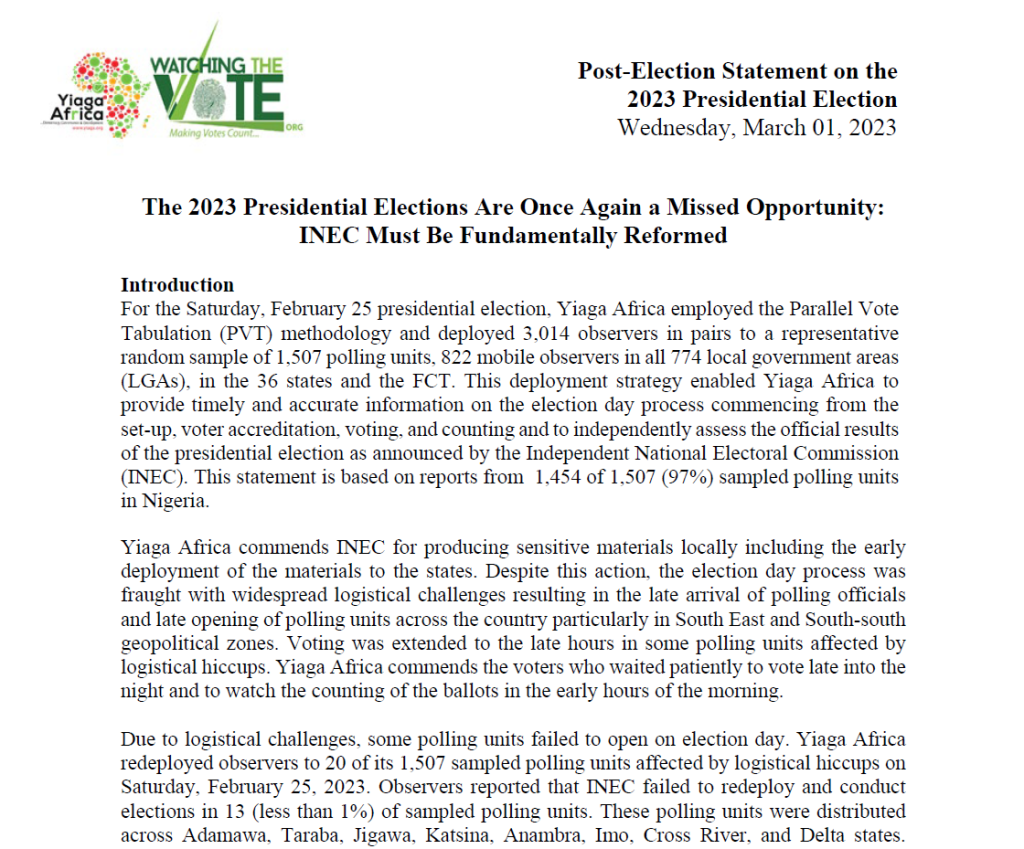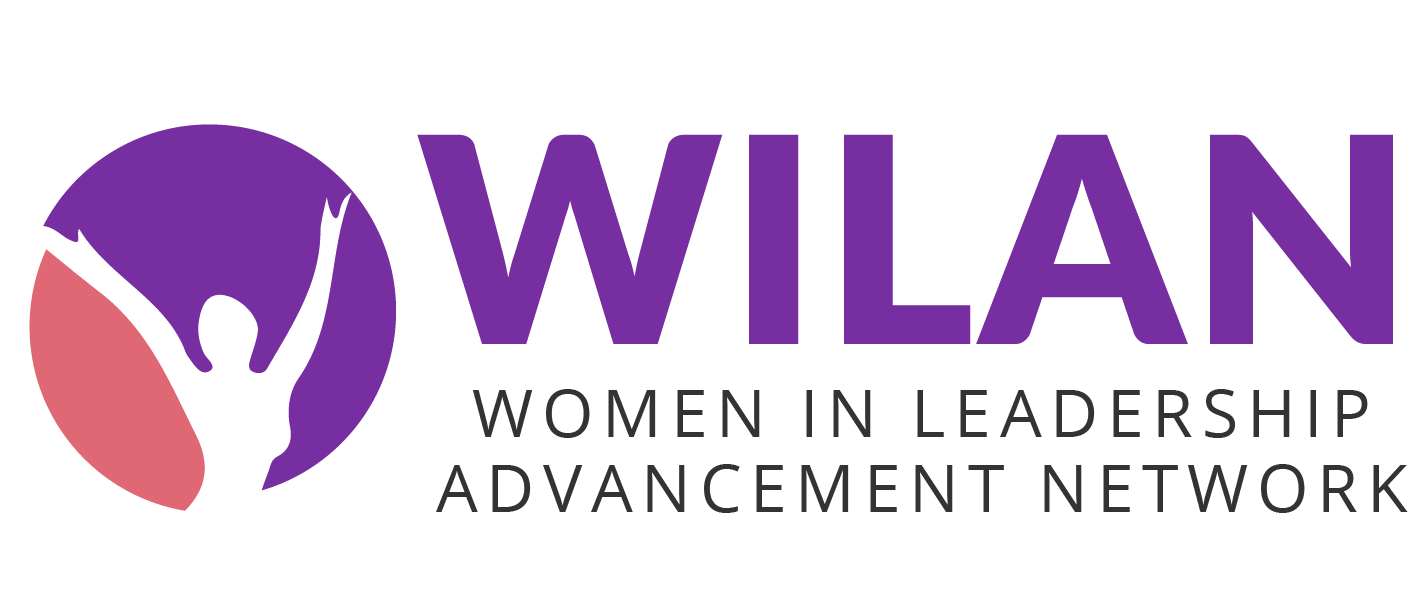Yiaga Africa Post-Election Statement on the 2023 Presidential Election
Unspecified topic

DESCRIPTION:
For the Saturday, February 25 presidential election, Yiaga Africa employed the Parallel Vote Tabulation (PVT) methodology and deployed 3,014 observers in pairs to a representative random sample of 1,507 polling units, 822 mobile observers in all 774 local government areas (LGAs), in the 36 states and the FCT. This deployment strategy enabled Yiaga Africa to provide timely and accurate information on the election day process commencing from the set-up, voter accreditation, voting, and counting and to independently assess the official results of the presidential election as announced by the Independent National Electoral Commission (INEC). This statement is based on reports from 1,454 of 1,507 (97%) sampled polling units in Nigeria.
Yiaga Africa commends INEC for producing sensitive materials locally including the early deployment of the materials to the states. Despite this action, the election day process was fraught with widespread logistical challenges resulting in the late arrival of polling officials and late opening of polling units across the country particularly in South East and South-south geopolitical zones. Voting was extended to the late hours in some polling units affected by logistical hiccups. Yiaga Africa commends the voters who waited patiently to vote late into the night and to watch the counting of the ballots in the early hours of the morning.
Due to logistical challenges, some polling units failed to open on election day. Yiaga Africa redeployed observers to 20 of its 1,507 sampled polling units affected by logistical hiccups on Saturday, February 25, 2023. Observers reported that INEC failed to redeploy and conduct elections in 13 (less than 1%) of sampled polling units. These polling units were distributed across Adamawa, Taraba, Jigawa, Katsina, Anambra, Imo, Cross River, and Delta states. INEC’s inability to conduct elections in those polling units denied voters the opportunity to exercise their right to vote.
The creation of additional polling units was a positive and long-needed step by INEC. However, the implementation failed to address overcrowding. As a result, there were polling units with fewer than 10 registered voters and others with over 10,000. Some voters who were migrated to new polling units experienced difficulties locating their respective polling units.
In the course of the election, Yiaga Africa expressed concerns about the delay in uploading polling unit results for the presidential election on the INEC Election Results Viewing Portal (IReV). As of today, only 73% of the polling unit-level results have been uploaded. Undoubtedly, the delay in uploading the polling unit-level results cast doubts on the credibility of the results management process resulting in broken public trust in electoral technology. Yiaga Africa notes that the delayed upload of the results on the IReV is a flagrant disregard of INEC’s Regulations and Guidelines, and it failed to meet citizens’ expectations.
Once again, the 2023 Presidential and National Assembly elections were a missed opportunity. Factors like serious logistical and technological shortcomings, non-compliance with electoral guidelines, lack of transparency, and manipulation of election results undermine public confidence in INEC and the overall outcome of the elections. Yiaga Africa notes that the integrity of electoral outcomes are influenced by processes and procedures. Therefore, a compromised process will produce questionable outcomes.
Yiaga Africa condemns the cases of violence and disruption of the voting and results collation process by thugs and hoodlums, especially the violence targeted at National Youth Service Corp (NYSC) members and INEC staff. These cases of violence undermine Nigeria’s electoral reform project.
Yiaga Africa commends INEC for producing sensitive materials locally including the early deployment of the materials to the states. Despite this action, the election day process was fraught with widespread logistical challenges resulting in the late arrival of polling officials and late opening of polling units across the country particularly in South East and South-south geopolitical zones. Voting was extended to the late hours in some polling units affected by logistical hiccups. Yiaga Africa commends the voters who waited patiently to vote late into the night and to watch the counting of the ballots in the early hours of the morning.
Due to logistical challenges, some polling units failed to open on election day. Yiaga Africa redeployed observers to 20 of its 1,507 sampled polling units affected by logistical hiccups on Saturday, February 25, 2023. Observers reported that INEC failed to redeploy and conduct elections in 13 (less than 1%) of sampled polling units. These polling units were distributed across Adamawa, Taraba, Jigawa, Katsina, Anambra, Imo, Cross River, and Delta states. INEC’s inability to conduct elections in those polling units denied voters the opportunity to exercise their right to vote.
The creation of additional polling units was a positive and long-needed step by INEC. However, the implementation failed to address overcrowding. As a result, there were polling units with fewer than 10 registered voters and others with over 10,000. Some voters who were migrated to new polling units experienced difficulties locating their respective polling units.
In the course of the election, Yiaga Africa expressed concerns about the delay in uploading polling unit results for the presidential election on the INEC Election Results Viewing Portal (IReV). As of today, only 73% of the polling unit-level results have been uploaded. Undoubtedly, the delay in uploading the polling unit-level results cast doubts on the credibility of the results management process resulting in broken public trust in electoral technology. Yiaga Africa notes that the delayed upload of the results on the IReV is a flagrant disregard of INEC’s Regulations and Guidelines, and it failed to meet citizens’ expectations.
Once again, the 2023 Presidential and National Assembly elections were a missed opportunity. Factors like serious logistical and technological shortcomings, non-compliance with electoral guidelines, lack of transparency, and manipulation of election results undermine public confidence in INEC and the overall outcome of the elections. Yiaga Africa notes that the integrity of electoral outcomes are influenced by processes and procedures. Therefore, a compromised process will produce questionable outcomes.
Yiaga Africa condemns the cases of violence and disruption of the voting and results collation process by thugs and hoodlums, especially the violence targeted at National Youth Service Corp (NYSC) members and INEC staff. These cases of violence undermine Nigeria’s electoral reform project.



